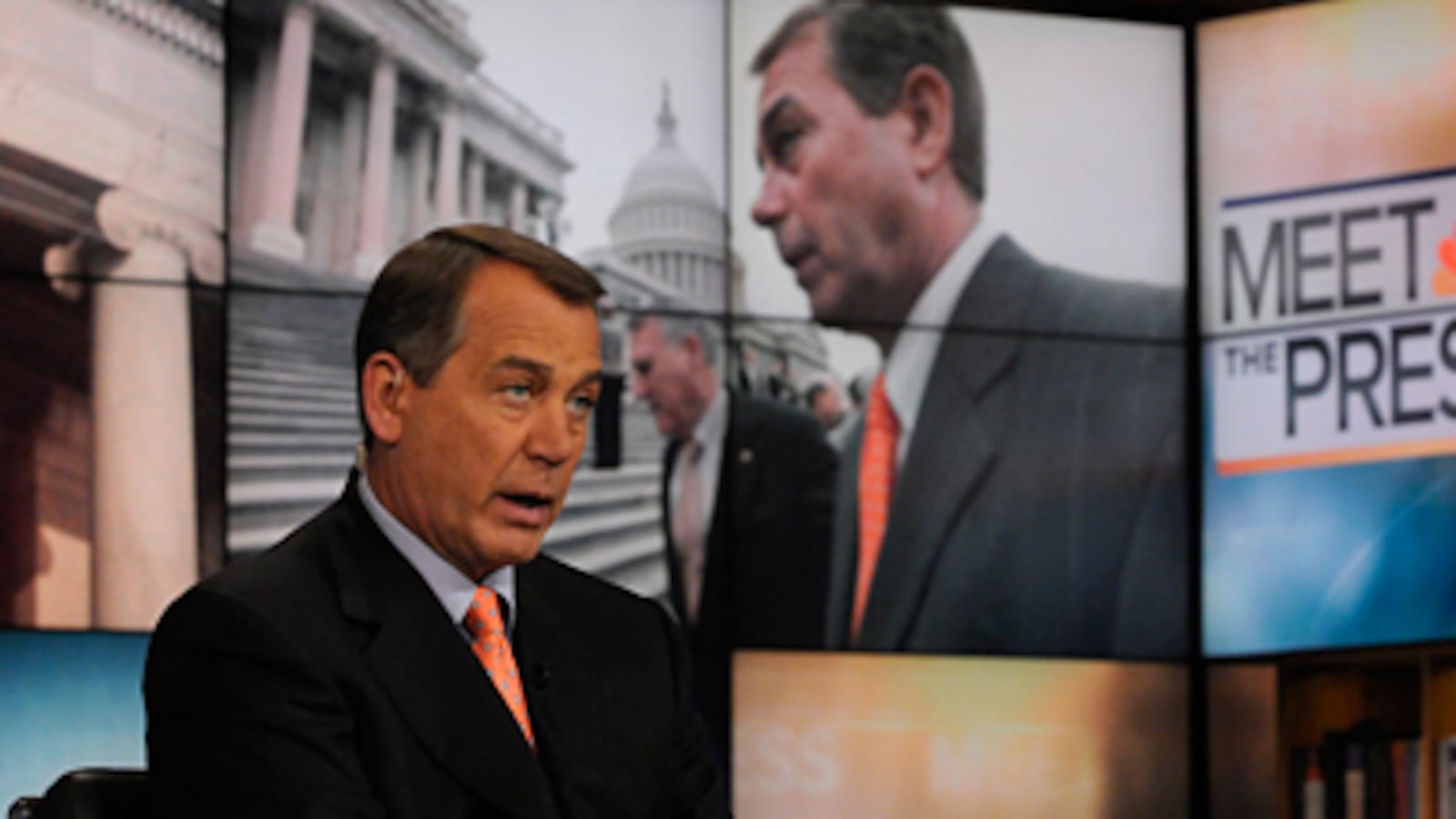Despite weeks of alarm and hand-wringing, there was never going to be a shutdown because neither Democrats nor Republicans wanted to risk voter backlash, writes Howard Kurtz. Plus, the government programs both Democrats and Republicans hate.
The drumbeat has been building for weeks: The government could shut down! Both sides are digging in! Be very, very afraid.
Not a chance. There was never going to be a shutdown. This was a classic media-generated story, based more on political posturing and a thirst for melodrama than any real evidence that federal agencies would be forced to close their doors. The two-week stopgap agreement that both sides hammered out ahead of Friday's deadline simply kicks the can down the budgetary road, but the odds are overwhelming that another compromise will be cobbled together when it is set to expire.

The reason: Neither side wants to risk a backlash from the voters.
"The mainstream press is terrified of being accused of partisan bias and has adopted a model of ‘balance,'" says Thomas Mann of the Brookings Institution. "He said, she said: It's safer that way." A "horse race" approach to a possible shutdown, he says, "is a better story, easier to write and sell."
That's certainly been true on television. "A government shutdown, the possibility is not only real but could be just days away," said Fox's Sean Hannity.
"High noon a-comin'," warned MSNBC's Chris Matthews.
"The clock is ticking with a government shutdown still looming," said CNN's Ali Velshi.
"The government is facing a looming deadline that could lead to the first shutdown in 15 years," Savannah Guthrie said on the Today show.
And then there are the print folks. "With Government Shutdown Looming, Freshmen Are the Wild Cards," said The Washington Post. "Keep the Government Open," a New York Times editorial urged. "How a Government Shutdown Could Happen," said a Politico piece that offered five handy reasons why.
Not that journalists were predicting the first shutdown since Bill Clinton and the Republicans famously reached an impasse in 1995. The prospect was always just floating in the ether, like the possibility that an asteroid could strike the earth and wipe out life as we know it.
The back story here is that reporting on the details of competing budget proposals is monstrously boring. But a shutdown, no matter how remote, imposes a plot and a timetable. You can even run a countdown clock!
If you look at what John Boehner and top Republicans have been saying, they have never made noises about forcing a shutdown.
"Americans want the government to stay open, and they want it to spend less money," the House speaker said late last week. "We don't need to shut down the government to accomplish that."
Democrats, on the other hand, took to arguing that the GOP was still plotting to turn off the government's engine. Sen. Chuck Schumer told CNN on Feb. 20 that Boehner and Mitch McConnell hadn't taken the option "off the table" and that "there are lots of people on the hard right clamoring for a shutdown."
Norm Ornstein of the American Enterprise Institute contends that reporters were right to discount Boehner's words. "Of course John Boehner is going to say I don't want a shutdown—he's learned one lesson from '95," Ornstein says. "If there is a shutdown, he doesn't want to be blamed."
The back story here is that reporting on the details of the competing budget proposals, their impact on the deficit, and the various continuing resolutions—not to mention the finer points of slashing current 2011 spending versus the fiscal 2012 appropriations—is monstrously boring. It's doesn't make for a punchy headline or a tantalizing tease, and it changes oh-so-incrementally as 535 lawmakers and the White House maneuver for position.
But a shutdown, no matter how remote, imposes a plot and a timetable. You can even run a countdown clock!
The perfect faux drama, in other words, for a city that thrives on political imagery.
Now I know all the scenarios for how a shutdown still might happen. Boehner loses control of his rebellious House freshmen, who vowed to take a meat axe to the budget. The Senate might refuse to go along with $60 billion in House Republican cuts. And on and on.
"I don't think we're any closer to resolving this for the rest of the year," Mann says.
Ornstein goes a step further, saying the freshmen and their "pitchforks" will shred any wimpy compromise. "I think there will be a shutdown before we're done with this," he says.
Well, maybe. But both sides have a powerful incentive to paper over their disagreements.
Barack Obama has to worry that a shutdown would damage the fledgling economic recovery—and that public anger could boomerang on a seemingly ineffective president. Just because Newt Gingrich's histrionics turned the 1995 episode into a political plus for Clinton doesn't mean that particular history would repeat itself.
Boehner and the Republicans have to worry that, as the party that doesn't much like government, they will be seen as the hotheads who forced the shutdown. People may hate the abstraction called Big Government, but they sure like their favorite programs.
About the only sure bet is that the media will again trumpet the possibility of a shutdown as the next deadline draws near. Mark my words. The clock is ticking.
Howard Kurtz is The Daily Beast's Washington bureau chief. He also hosts CNN's weekly media program Reliable Sources on Sundays at 11 a.m. ET. The longtime media reporter and columnist for The Washington Post, Kurtz is the author of five books.





